The controversial gold mine set to go before a planning inquiry
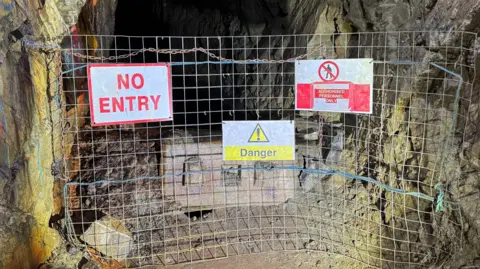 BBC
BBCA public inquiry into a controversial gold mine in County Tyrone is due to begin next week.
Dalradian has been working on the Curraghinalt site near Greencastle in the Sperrin Mountains since 2009 with the aim of developing an underground mine.
It is said to contain one of the world's most significant undeveloped gold deposits as well as substantial quantities of silver, copper and other minerals.
But the plans have divided the local community, with some welcoming the prospect of jobs and investment while others remain concerned about the impact on health and the environment.
The Planning Appeals Commission (PAC) inquiry will begin on Monday at the Strule Arts Centre in Omagh.
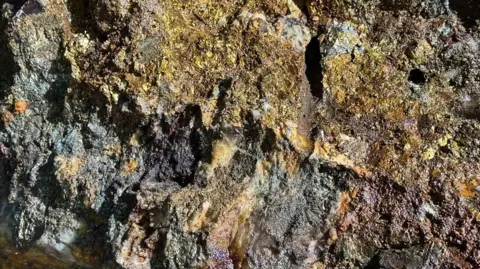
Is there gold in the Sperrin Mountains?
Dalradian believes the site could yield 100 tonnes of gold, 48 tonnes of silver and 15,000 tonnes of copper in its 20 to 25-year lifetime.
The mineral exploration and development company, which was originally a Canadian firm. first submitted an application to mine in 2017.
It is now owned by a US investment fund, Orion Resource Partners, who have put $400m (£330m) into the project to date.
Dalradian's community relations manager Peter McKenna said the company welcomes the start of the public inquiry.
"We've submitted extensive proposals to build an environmentally responsible project which will bring economic and social benefits right across our local community," he said.
"This will be one of the largest ever investments by a US company and it will create and support up to 1,000 jobs."
The company claims it will add £5bn (£4.1bn) to the Northern Ireland economy.
How would the Tyrone gold mine work?
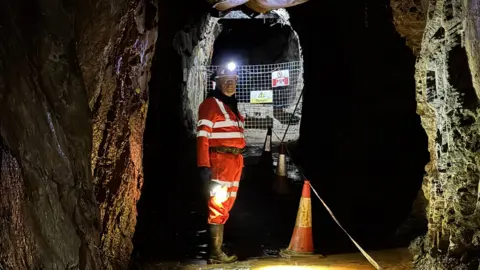
The precious metals have been found in underground seams approximately one metre wide.
Dalradian says the rock would be excavated using precision drilling and blasting.
It would be crushed and sorted underground, before being milled into a finer substance at the surface.
The minerals would then be separated in flotation tanks.
The company says this process will no longer involve the use of cyanide, which it dropped as part of a revised planning application in 2019.
The concentrate would then be shipped overseas for refining into gold, silver and copper.
Most of the rock would be returned underground, but a stack of mine spoil up to 17 meters high would be contoured into the local landscape and replanted.
What do local people think?
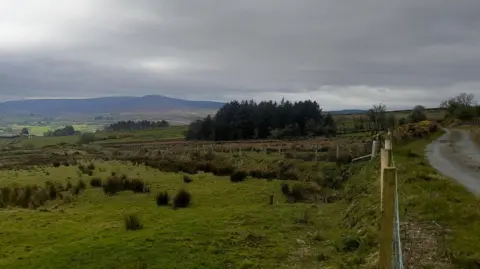
The mine is located in an Area of Outstanding Natural Beauty, close to the Owenkillew and Owenreagh rivers which contain several protected species.
Campaign group Save Our Sperrins was formed in 2015 to oppose the mine's development and Emmet McAleer, a former independent councillor in Mid Tyrone, was elected in 2017 as an anti-gold mine candidate.
He feels it is a "massive uphill battle" for the local people to take on the experts employed on behalf of the mining company.
"I think when you look at the natural beauty that's under threat from this proposed toxic development, you don't need that technical knowledge or that scientific background to know this is not a good proposal."
He said it is about protecting the environment, peoples' health and their way of life.
"We want to be able to look our children and our grandchildren in the eyes and say we stood up, we fought this and we got this company out of our area, because they're the ones that are proposing the destruction of the Sperrins area of natural beauty."
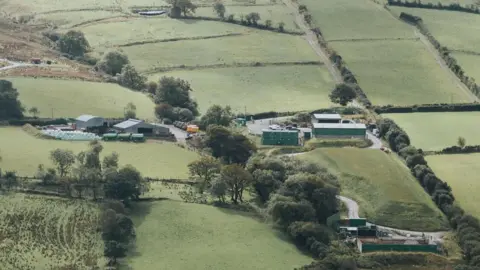
Not everyone living in the area is opposed to the mine.
The Silent Majority Community Group welcomes the prospect of jobs and investment.
The group says the majority of the 50,000 objections to the proposal came before Dalradian ditched the use of cyanide.
It believes the company's environmental commitments have increased local confidence in the project.
What will happen at the public inquiry?
The inquiry was ordered by former infrastructure minister Nichola Mallon in 2020.
It was scheduled to start last year but confusion over two licence applications relating to water abstraction and storage brought proceedings to a halt.
The Planning Appeals Commission public hearings will now begin on Monday and continue until the end of March.
The first two days will cover strategic matters and the principle of development, with representations from Fermanagh and Omagh and Derry City and Strabane district councils.
The inquiry will then examine environmental and public health issues including air quality, lighting, noise, radon, vibration and electric and magnetic fields.
The second week will consider the impact on water, water ecology and peat.
Hearings will then resume at the end of February looking at the landscape and visual impact and non-water ecology.
In March the topics for the inquiry include the mine waste plan, health and safety, culture and heritage, socio-economic matters, climate and transport.
The planning commissioners will then make recommendations, but it will be up to ministers in the Northern Ireland Executive to decide whether planning permission is granted.
